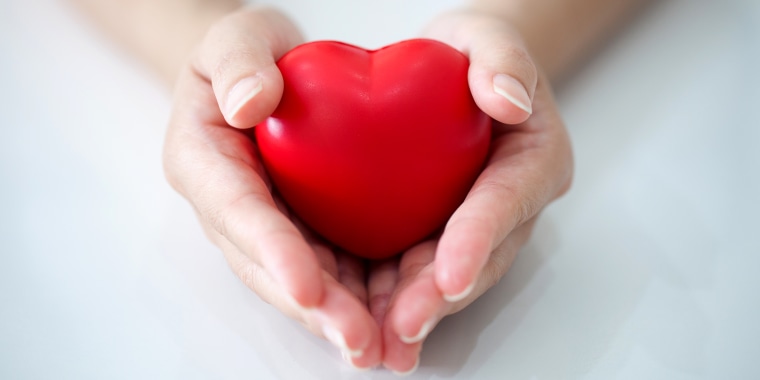Take a deep breath and feel your heart beating. The grapefruit-size pump is what’s keeping you alive right now and if all goes well, it’ll beat almost three billion times from birth to death.
It can also kill quickly, without warning, faster than any organ in your body, warns Dr. Sandeep Jauhar, a cardiologist and author of "Heart: A History."
With almost half of all Americans now living with some form of heart or blood vessel disease, Jauhar believes cardiology in its current form has reached the limits of what it can do to extend life.
The next frontier of advances will come from cardiac psychology: Looking at how emotions affect the heart, and finding better ways to deal with stress and depression.
“Our emotional lives have profound consequences for the biomechanical pump,” Jauhar, director of the Heart Failure Program at Long Island Jewish Medical Center, told TODAY.
“Today, the research doesn’t suggest that type A [personality] is a huge factor in developing heart disease. The focus is more on the type D personality — people who are more anxious and depressed. That seems to have a significant correlation with the development of heart disease.”
The cardiologist began worrying about his own risk after a brief health scare recently.
Here’s how Jauhar now takes care of his own heart:
Do something every day that relieves stress
Jauhar: If I‘ve learned anything in my almost 20 years as a cardiologist is that stress and the heart don’t mix well. Everyone is different, so I would encourage people to find what works for them and really pursue it.
My wife copes with stress in a very different way than I do. She’s really into her yoga practices. I don’t feel I get as much benefit from yoga.
I focus more on doing aerobic exercise. Other people really need more opportunities to meet with friends. Some people find stress reduction just by being in nature. I personally find that very de-stressing also.
Do daily exercise that focuses on cardio
Jauhar: I find that if I exercise too much one day, I’m sore the next day, so I tend to do an abbreviated interval training workout on a treadmill. I do that every day for about 15 minutes. I just feel the best afterwards.
It’s pretty clear that running is really good for the heart. I find a run produces more stress reduction for me than an intense weight lifting workout or even Bikram yoga, where I’m sweating a lot and it’s really hard, but I just don’t tend to get the same degree of benefit.
Eat a mostly plant-based diet
Jauhar: The diet that has the most data behind it for heart health and also for brain health is the Mediterranean diet.
The single best bit of advice is what Michael Pollan presented, which is: “Eat food. Not too much. Mostly plants.” What he means by that is eat food that your grandmother would recognize as food — real, whole foods. Don’t eat stuff like Twinkies.
My diet has a sparing amount of red meat, is very fish-heavy and heavy in fruits and vegetables. If I want to have red meat, lamb or steak, I let myself have it. I don’t do it every day, but I think it’s a lot better than eating processed carbohydrate enriched food.
Drink a little alcohol
Jauhar: I usually drink several glasses of wine a week. Not every day, but I like to drink wine.
We know that even small amounts of alcohol can increase the risk of cancer, but small amounts of alcohol, like a glass of wine a day, can also be beneficial for the heart. So you may be increasing one risk and depressing another risk.
For me at least, I’ve elected to assume that one drink is OK.
Enjoy a few eggs. Skip the highly processed foods
Jauhar: Dietary consumption of cholesterol plays a really small role in serum cholesterol. Mostly, it’s genetic.
I don’t think eggs are bad. I don’t think dairy is necessarily bad. I eat several eggs a week. When I was growing up, eggs were almost taboo — people would say they’re bad for you. The pendulum has swung so far in the opposite direction and I think in a more correct direction.
My overall feeling is that it’s enriched processed food that's really the big enemy of heart health. High-glycemic index foods that cause insulin spikes, and highly processed foods that are full of artificial ingredients — those are probably bad. When I see foods that have high fructose corn syrup, I tend to avoid them.
Get your emotional house in order
Jauhar: Look at the sources of stress in your life. Do you hate your job? If so, are there things you can do to make it more tolerable? Do you have a bad relationship with your significant other or your children? Is there something you can do? These things are corrosive over the long run and really should be addressed.
Don’t count on stents and pacemakers to make everything better
Jauhar: Stents have been shown to be beneficial in terms of extending life really only in patients who are having heart attacks or have unstable angina. A patient who is otherwise fine but only develops some chest pain when walking up a hill — there’s really no good data to suggest those patients should receive stents, but they do.
There are patients who receive implantable pacemakers and defibrillators who probably wouldn’t consent to them if they knew what they entailed. Defibrillators, for example, don’t make a patient feel better; they just prevent a sudden death from a cardiac arrhythmia. But they also take away the sudden death option — a painless way of demise — and sometimes that option is something that patients don’t want taken away from them.

